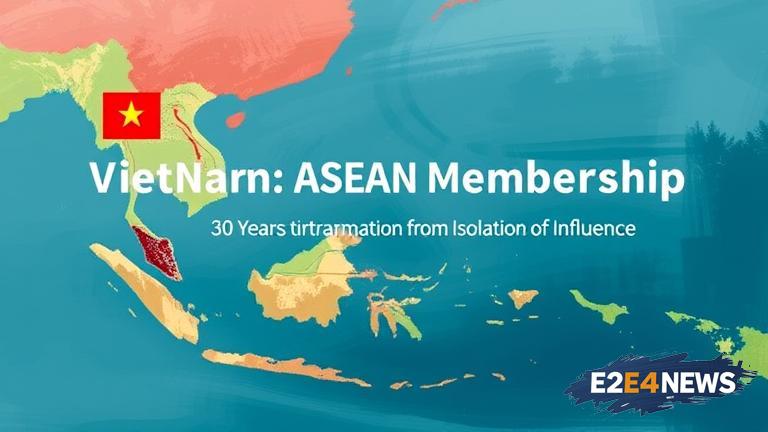Vietnam’s accession to the Association of Southeast Asian Nations (ASEAN) in 1995 marked a significant turning point in the country’s history. After years of isolation, Vietnam began to integrate into the regional and global economy. Over the past 30 years, Vietnam has made tremendous progress in strengthening its ties with other ASEAN member states. The country has actively participated in various ASEAN-led mechanisms, such as the ASEAN Summit, the ASEAN Regional Forum, and the East Asia Summit. Vietnam has also played a key role in promoting regional cooperation in areas such as trade, investment, and tourism. The country’s membership in ASEAN has enabled it to expand its economic ties with other member states, with trade volumes increasing significantly over the years. Vietnam has also become an attractive destination for foreign investment, with many ASEAN countries investing heavily in the country. In addition to economic cooperation, Vietnam has also strengthened its political and security ties with other ASEAN member states. The country has participated in various regional security initiatives, such as the ASEAN Defense Ministers’ Meeting and the Shangri-La Dialogue. Vietnam has also played a key role in promoting regional cooperation in areas such as counter-terrorism, non-proliferation, and disaster management. The country’s membership in ASEAN has also enabled it to strengthen its ties with other major powers in the region, such as China, Japan, and the United States. Vietnam has become an important player in regional affairs, with its views and opinions being sought after by other countries. The country’s 30 years of ASEAN membership have been marked by significant achievements, including the signing of the ASEAN Charter, the establishment of the ASEAN Economic Community, and the launch of the ASEAN Single Window. Vietnam has also hosted several major ASEAN events, including the ASEAN Summit and the ASEAN Ministerial Meeting. The country’s membership in ASEAN has also enabled it to promote its national interests and values, such as sovereignty, independence, and self-reliance. Vietnam has also played a key role in promoting regional cooperation in areas such as climate change, sustainable development, and human rights. The country’s 30 years of ASEAN membership have been marked by significant challenges, including the need to balance its relations with major powers, manage its territorial disputes, and address regional security concerns. Despite these challenges, Vietnam remains committed to its membership in ASEAN and continues to play an active role in promoting regional cooperation and integration. The country’s future in ASEAN looks bright, with opportunities for further economic growth, political cooperation, and social development. Vietnam’s 30 years of ASEAN membership have been a resounding success, and the country is well-placed to continue playing a key role in regional affairs in the years to come. The country’s experience and expertise in regional cooperation and integration will be invaluable in shaping the future of ASEAN and promoting peace, stability, and prosperity in the region. Vietnam’s membership in ASEAN has also enabled it to strengthen its ties with other regional organizations, such as the European Union and the Asian-Pacific Economic Cooperation forum. The country has also played a key role in promoting regional cooperation in areas such as education, science, and technology. Vietnam’s 30 years of ASEAN membership have been marked by significant milestones, including the country’s chairmanship of ASEAN in 2010 and its hosting of the ASEAN Summit in 2019. The country’s future in ASEAN will be shaped by its ability to balance its national interests with its regional responsibilities, and to promote cooperation and integration in areas such as trade, investment, and security.
